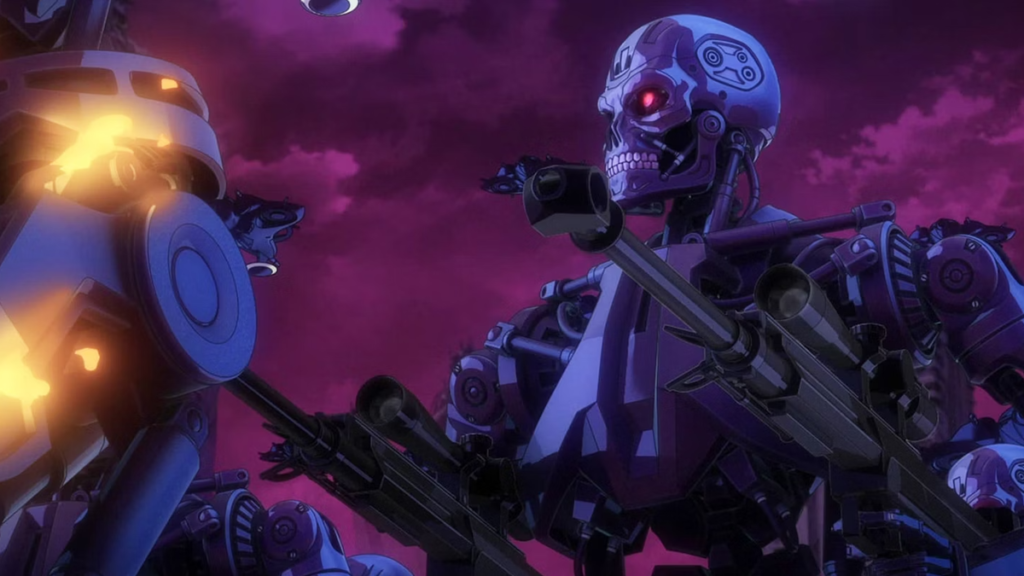A still from ‘Terminator Zero’
| Photo Credit: Netflix
For a franchise that once defined bleeding edge sci-fi cinema, James Cameron’s evanescing vision for the series has increasingly felt like a relic of its own dystopian future of late. The past few instalments — a shoddy convoluted mess of tangled timelines and diminishing returns — seemed more like a stubborn refusal to let go than a meaningful continuation of a story that, let’s face it, was perfectly wrapped up in 1991. But when it seemed like Skynet and its menacing metallic minions had finally been terminated for good, Netflix’s latest venture — in a series of successful animated projects — serves as an inexorable system patch that breathes new life into the franchise by posing a new question: What if humanity isn’t worth saving after all?
In its first animated, let alone anime, outing, the Terminator franchise takes a bold and necessary leap, relocating the action from the familiar streets of Los Angeles to the neon-lit haze of 90’s Tokyo. Series creator Mattson Tomlin’s decision revitalises the very core of the series rather than just refresh its scenery. Directed by Masashi Kudô and brought to life by the renowned Japanese animation studio Production I.G., Terminator Zero wraps the alloyed coatings of its pulse-pounding thrills around its cerebral, philosophical musings.
Terminator Zero (Japanese)
Creator: Mattson Tomlin
Cast: Yuuya Uchida, Toa Yukinari, Saori Hayami, Atsumi Tanezaki
Episodes: 8
Runtime: 25 to 30 mins
Storyline: The day before Judgment Day, Malcolm Lee finds himself and his three children pursued by an unknown robot assassin, and a mysterious soldier from the year 2022
The series follows Malcolm Lee, a beleaguered scientist who locks himself away with his AI creation, Kokoro — the Japanese couter-part to Cyberdyne’s Skynet — in a desperate bid to prevent Skynet’s nuclear onslaught by bringing her online. But before he can even activate her, Malcolm faces an existential dilemma. Meanwhile, a relentless T-800 who has hurtled back through time to eliminate him is pitted against a resistance fighter from the future, along with Malcolm’s kids and their soft-spoken babysitter.
The beating heart of the narrative is a concerningly prescient conversation that echoes the AI-obsessed existential dread of our age: with humanity’s self-destructive propensity towards war and ceaseless conflict, does it truly deserve to be preserved? It’s a question posed by Kokoro, and it’s one that Zero tackles with a nuance and moral ambiguity that the franchise has seldom dipped its heavy metal toes in before. The dialogue between Kokoro and Malcolm takes a dive off the deep end into the ethics of artificial intelligence that are unsurprisingly relevant.
A still from ‘Terminator Zero’
| Photo Credit:
Netflix
Of course, this is still the Terminator universe, and Zero doesn’t skimp on its characteristic adrenaline rushes. The series is packed with the kind of visceral, beautifully choreographed fluidity that anime does so well, which was sorely lacking in the recent live-action franchise instalments. But what’s remarkable here is how the show balances these sequences with its more contemplative moments. One moment, we’d witness the cataclysmic fallout of Judgment Day play out in unflinching detail, and the next, we’re treated to a quiet, almost meditative conversation on the nature of fate. It’s this delicate equilibrium that Kudô and his team sustain with aplomb.
The series also wisely moves away from an overreliance on Arnold Schwarzenegger’s iconic but increasingly anachronistic presence. Instead, it introduces a new, terrifyingly efficient T800 — a chameleonic antagonist who’s as cunning, relentless and terrifying. Free from the constraints of live-action, this new Terminator is rendered with a disconcertingly inhuman precision, that makes him one of the most formidable foes in the franchise’s history.
Complementing its stunning visuals are the combined efforts of composers Michelle Birsky and Kevin Henthorn who put together an evocative mood-board of musical ideas that lends the series a tenderness beyond its fatalistic underpinnings.
But what truly sets Zero apart is its willingness to grapple with the darker implications of the Terminator mythos. Gone are John and Sarah Connor’s fervent dreams of cancelling the apocalypse. In its stead, is a fresh take about whether the apocalypse might actually be a mercy. The series’ Japanese setting offers a lens through which it explores themes of technological hubris and the scars of history. The shadow of World War II looms large over the production, and the decision to drop weapons of mass destruction on the island nation (again) more than compensates for Oppenheimer’s reductive, glorified lapses on the destructive potential of unchecked technology.
It’s too soon to explore certain characters (one, particularly tormented by her duplicitous past) and their implications without giving too much away, but Zero succeeds where so many previous attempts to revive the franchise have failed because it dares to do something different. It expands on the recaptured magic of the originals and offers provocative new questions for a new generation. Terminator Zero espouses a return to form in favour of a new form altogether, one that is far more thought-provoking than the ideas Cameron set in motion 40 years ago.
Terminator Zero is currently streaming on Netflix

